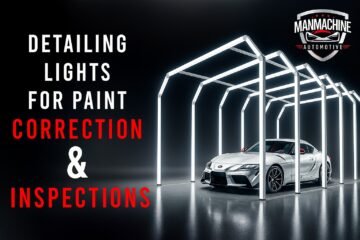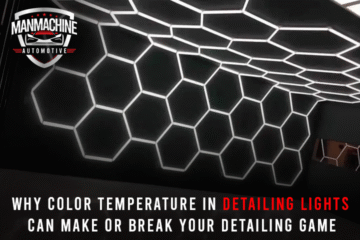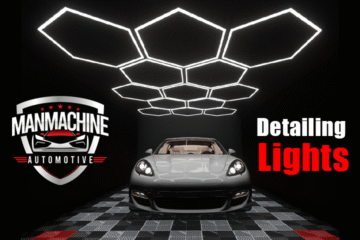In the world of automotive detailing, detailing lights for bike detailing are more than just one tool to illuminate your field. This is an essential part of your tool, especially when working on two-wheelers, where the contours, curves, and complex parts require the highest level of accuracy.
But when it comes to the bikes, many enthusiastic and even some professionals ask if it is really necessary to have detailing lights for bike detailing. After all, motorcycles are smaller than cars, right? Can’t you just work under standard garage lights or natural sunlight?
If you think the same, this blog will help you understand the fundamental importance of detailing lights for bike detailing, and it is a worthy investment for your layout.
Understand Detailing Light
Detailing lights for bike detailing are a special lighting arrangement designed to reveal surface errors such as swirls, holograms, scratches, oxidation, and uneven coating. These lights copy natural daylight or provide high CRI (Colour Rendering Index) output, so detailers can see the errors that cannot be revealed by typical garage or light bulbs.
There are different types of detail light:
- Handheld inspection lights
- Headlamp or portable lights
- Panel lights or floodlights
- Tripod-mounted lights
- Scangrip-style colour match lights
Each of these depends on the level of the necessary detailing, and the size/type of vehicle is which is being detailed.
Why are Detailing Lights for Bike Detailing Required?
Bike comes up with a unique set of challenges when it comes to detailing:
- Complex shapes and sharp angles: The bike has far more exposed mechanical parts, narrow cracks, and complex shapes than cars. Some often notice these areas under standard lighting.
- Small surface area is equal to more checks: The motorcycle’s small size does not mean that it is easy to detailing. In fact, every flaw is more noticeable, especially in a show bike or premium sports bike.
- Paint finish varies greatly. The bike can have a mix of mats, shine, chrome, and plastic on the same panel. Accurate lighting is required to identify defects on these different surfaces.
- Low room for errors: Fewer and more visible panels, any error or missed place is noticeable; therefore, proper lighting reduces such risks.
So the answer is yes, a bike detailing lighting setup increases the accuracy and outcome of it.
Standard Garage Lights vs. Professional Detailing Lights for Bikes
Let’s break down the difference between regular lighting and professional best lights for motorcycle detailing.
| Feature | Garage Lighting | Detailing Lighting |
| Color Temperature | 2700K–4000K (Warm) | 5000K–6500K (Daylight White) |
| CRI (Colour Rendering Index) | 60–80 | 90+ |
| Mobility | Fixed | Portable, Adjustable |
| Focus | General illumination | Highlighting defects |
| Shadow Elimination | Poor | Excellent |
| Light Placement | Ceiling-mounted | Flexible, targeted angles |
Garage lights are designed to illuminate the room, not the vehicle. Motorcycle paint correction lighting is engineered to highlight imperfections and provide accurate colour rendering, which is critical for professional detailing.
The Top Advantages of Using Detailing Lights for Bike Detailing
1. Reveal each deficiency, no matter how small it is
Detailing Light Exposes:
- Swirl marks
- Fine scratches
- Paint dullness
- Holograms from improper buffing
- Wax/sealant residues
Even the slightest imperfection is illuminated, giving you a roadmap for improvement.
2. Ensure a smooth coating application
Whether you’re applying ceramic coating, wax, or paint sealant, detailing light, make sure you:
- Don’t miss any place
- Get an even layer of it
- Prevent any high streaks or spots
It is essential for small tanks, curved fenders, or matte surfaces where errors are more evident.
3. Work effectively and accurately
Working under the right light reduces rebirth. This allows you to correct problems instantly while doing the process instead of searching for it under a separate lighting (or worse, by the customer) later.
4. Ideal for paint correction jobs
Polishing the bike without proper detailing lights for bike detailing is like painting in the dark, as it is necessary for you to:
- See clearly “before and after”
- To know how aggressive the compound is
- Avoid over-polishing or burning through a clear coat.
5. Choosing professionalism and trust
Customers notice when you take things seriously. A dedicated detailing lights for bike detailing showcases how dedicated you are to delivering your service and your work, especially for owners who have a luxury bike.
Do you Always Need High-End Detailing Lights for Bike Detailing?
Not necessarily. Depending on the need:
- Your skill level
If you are a beginner, a good-quality handheld can be a good start. However, advanced lighting is needed for professionals or detailers who offer detailing services.
- What kind of work are you doing?
Basic wash and wax, then for this surrounding light would be sufficient.
Paint improvement, ceramic coating, PPF, then here in you need detailing lights for bike detailing is definitely necessary.
- Your workplace
Investing in good-quality detailing lights for bike detailing is a game-changer in a poorly lit garage or basement.
Common Errors to Avoid When Doing Detailing Work
- Using warm light
This hides the swirl marks and errors. Always use daylight (5000K -6500K) temperature.
- More dependence on a single light source
Use multiple angles to observe each surface, especially curved and chrome parts.
- Ignoring the shadow formation
Position lights to avoid casting your shadow formation over the work area.
- Skipping light inspection after coating
Always recheck for residues under high places, missing sections under detailing lights for bike detailing.
What if you are a DIY bike enthusiast?
If you like to do detailing of your bike but do not do it professionally, it is still worth investing in a good-quality LED lights for bike detailing or an inspection torch, as it is still worth the investment. Why?
- You will get better cleaning and polishing results.
- Before they become worse, you will be able to catch minor errors.
- Your bike will always appear like it’s ready for a show, even at home.
And the most important thing is that the detailing work becomes more satisfying and fun when you can clearly see your results.
Conclusion
Detailing lights for bike detailing are not just a professional light, but it is a practical requirement for precision, perfection, and professionalism. Whether you remove the swirls, apply ceramic coating, or showcase the customer’s bike, the correct detailing lighting transforms a good detail into a flawless one.
Therefore, if you are still dependent on ceiling lights or working near a window, it is time to increase the lighting. Your bike deserves a spotlight.
FAQS
Q1. Do I use a ring light for bike detailing?
A1. It’s not recommended. A ring light is suitable for photography, but it lacks CRI and the temperature balance required to expose paint defects accurately.
Q2. Is a one detailing light enough for doing bike detailing work?
A2. A high-quality handheld light can work for random users. Professionals may require a combination of detailing lights to cover all angles and give there proper work outcome.
Q3. Does a matte bike need a detailing light?
A3. Absolutely. Matte finish bikes require good-quality of detailing lights. These detailing lights assist in spotting greasy fingerprints, streaks, and missed coating area, if any.
Q4. Do I use sunlight instead of a detailing light?
A4. Sunlight is great, but it is inconsistent and uncontrollable, whereas high-quality detailing lights will provide the same brightness for you to work properly while doing detailing work.
Q5. Is a bike detailing light different from car detailing lights?
A5. No, it’s the same detailing lights that can be used for both bikes and cars. These lights assist in giving natural and proper brightness of light to the detailers so that they can do their detailing work accurately.
Q6. Can the detailing lights help clean the engine and chain?
A6. Yes. Bright, focused detailing lights are beneficial when cleaning hard-to-reach spaces such as engines, underbodies, sprockets and chains. They improve visibility and ensure complete cleaning.



0 Comments